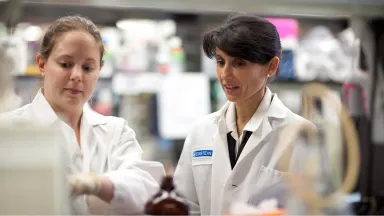
Myles Akabas, M.D., Ph.D.
- Professor, Dominick P. Purpura Department of Neuroscience
- Professor, Department of Medicine
- Director, Medical Scientist Training Program
- George Y. and Catherine H. Wu MSTP Directorship
Area of research
- Malaria parasite membrane transport physiology; mechanisms of purine, phosphate, and drug transport; development of novel antimalarial drugs that target the primary malaria purine import transporter and the phosphate transporter.
Phone
Location
- Albert Einstein College of Medicine Jack and Pearl Resnick Campus 1300 Morris Park Avenue Ullmann Building 209 Bronx, NY 10461
Research Profiles
Professional Interests
Malaria Parasite Physiology and Mechanisms of Nucleoside and Drug Transport
Malaria is a major public health problem affecting large areas of the world. About 600,000 people, mostly children and pregnant woman, die each year due to malaria. Malaria is caused by unicellular parasites from the Plasmodium species that grow inside erythrocytes. Plasmodium falciparum causes the most lethal form of malaria. Plasmodium spp. parasites are purine auxotrophs and require an exogenous source of purines to survive. They import purine precursors from the host erythrocyte via equilibrative nucleoside transporters (ENTs). Knockout of PfENT1 is lethal at purine concentrations found in human plasma. This suggests that PfENT1 inhibitors might kill parasites and represent a novel target for antimalarial drug development. We seek to characterize the purine nucleoside transporters and identify inhibitors as potential antimalarial drugs.
We have developed a yeast-based high throughput screen to identify PfENT1 inhibitors. We screened a 65,000 compound library and identified 171 hits. The nine best hits block PfENT1 and kill P. falciparum parasites in culture. We are characterizing the hits and exploring the SAR for the compounds to identify more potent derivatives. Additional work is focused on testing the hits against P. vivax ENT1 and in a mouse malaria model. In addition, in collaboration with GSK, they used our assay to screen their 1.8 million compound library. They have given us six of the best hits to develop as novel antimalarial drugs. We are currently in the hit-to-lead medicinal chemistry process to improve the potency and physicochemical properties of the hits. We are also investigating the molecular basis of their interaction with PfENT1 and the mechanism of their parasitocidal activity.
For additional information see Einstein News Release: Einstein Scientists Develop Novel Technique for Finding Drugs to Combat Malaria
Selected Publications
- Frame, I.J.*, Deniskin, R.*, Arora, A., and Akabas, M.H. (2015) Purine Import into Malaria Parasites as a Target for Antimalarial Drug Development. Ann. NY Acad. Sci. 1342:19-28 (*contributed equally)
- Frame, I.J.*, Deniskin, R.*, Rinderspacher, A., Katz, F., Deng, S-X., Moir, R.D., Adjalley, S.H., Coburn-Flynn, O, Fidock, D.A., Willis, I.M., Landry, D.W., and Akabas, M.H. (2015) Yeast-based High-Throughput Screen Identifies Plasmodium falciparum Equilibrative Nucleoside Transporter 1 Inhibitors That Kill Malaria Parasites. ACS Chem. Biol. 10(3):775-83. (*contributed equally)
- Akabas MH. Cysteine Modification: Probing Channel Structure, Function and Conformational Change. In: Novel Chemical Tools to Study Ion Channel Biology (Eds. Ahern, C. and Pless, S.) Springer Int. Publishing. Adv Exp Med Biol. 2015; 869:25-54.
- Sosa Y*, Deniskin R*, Frame IJ*, Steiginga MS, Bandyopadhyay D, Graybill TL, Kallal LA, Ouellette MT, Pope AJ, Widdowson KL, Young RJ, Akabas MH. Parallel Hit Progression Strategy Identifies Improved Small Molecule Inhibitors of the Malaria Purine Uptake Transporter that Inhibit Plasmodium falciparum Parasite Proliferation. ACS Infectious Dis. 2019; 5:1738−1753. (*contributed equally)
- Brass LF, Akabas MH. The national MD/PhD program outcomes study: 1. Training and career paths of program graduates. JCI Insight 2019; 4(19):e133009. https://doi.org/10.1172/jci.insight.133009
- Sosa Y*, Egbo D*, Akabas MH. Impact of Field Isolate Identified Nonsynonymous Single Nucleotide Polymorphisms on Plasmodium falciparum Equilibrative Nucleoside Transporter 1 Inhibitor Efficacy. ACS Infect Dis. 2020 Jan 13. doi: 10.1021/acsinfecdis.9b00203. [Epub ahead of print] PubMed PMID: 31876139. (*contributed equally)
- Gallagher EJ, Rockey DC, Kontos CD, Vyas JM, Brass LF, Hu PJ, Isales CM, Ajijola OA, Rathmell WK, Conlin PR, Baiocchi RA, Kazmierczak BI, Akabas MH, Williams CS. Pearls of wisdom for aspiring physician-scientist residency applicants and program directors. JCI Insight. 2022 Mar 22;7(6):e158467. https://insight.jci.org/articles/view/158467
- Brass LF, Fitzsimonds RM, Akabas MH. Gaps between college and starting an MD-PhD program are adding years to physician-scientist training time. JCI Insight. 2022 Mar 22;7(6):e156168. https://insight.jci.org/articles/view/156168
- Williams DKA, Christophers B, Keyes T, Kumar R, Granovetter MC, Adigun A, Olivera J, Pura-Bryant J, Smith C, Okafor C, Shibre M, Daye D, Akabas MH. Sociodemographic factors and research experience impact MD-PhD program acceptance. JCI Insight. 2024 Feb 8;9(3):e176146. https://insight.jci.org/articles/view/176146





